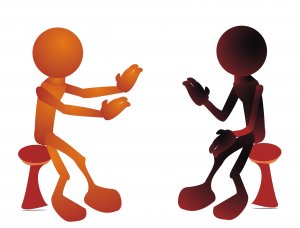Disruptive Innovation
The Wired Audiologist
Peter Stelmacovich, MCl Sc, is a hard of hearing audiologist who works for a Canadian manufacturer. In Peter’s column, The Wired Audiologist, he discusses many of the issues that affect him personally as both a hard of hearing consumer and an audiologist.
 I am writing this article on the flight back from Paris, France where I enjoyed a wonderful vacation with my family. Before boarding the flight I stumbled upon a book that described the changes in the music industry. Old news really, but it reflected upon the change from vinyl records that people actually paid for to today's digital music age in which music is more or less free. Now musicians make most of their revenue from live concerts.
I am writing this article on the flight back from Paris, France where I enjoyed a wonderful vacation with my family. Before boarding the flight I stumbled upon a book that described the changes in the music industry. Old news really, but it reflected upon the change from vinyl records that people actually paid for to today's digital music age in which music is more or less free. Now musicians make most of their revenue from live concerts.
Later, while in Paris, I experienced my first ride in an Uber taxi cab. It was fascinating actually. A few taps on the iPhone app and then a driver was dispatched to our location. We could even see his movements on a map in real time as he came closer to our pick up location. No money was ever exchanged, nor did I even need to hand the driver my credit card...it was all billed automatically to my son's account.
We also experienced the Paris Metro subway system. A mix of old and modern technologies, the newest trains were completely automated and driverless.
These were all examples of disruptive innovations that significantly change the way we do things. In audiology we have seen the effects of innovation, via the introduction of Universal Infant Hearing Screening programs combined with modern hearing aids, cochlear implantation, and wireless technologies. Today's child born with hearing loss no longer is forced to attend a specialized school for the Deaf and will realize spoken language and academic achievements that were never thought possible 20 years ago.
However, not all disruptive innovations are necessarily beneficial to all parties. As we have seen in the music industry, artists lost a huge source of revenues as a result of the digitization of music. Traditional taxi drivers are losing business to the competition from Uber. There are fewer jobs in the Paris Metro subway as the trains have become automated. Are there threats to our audiology profession from a similar magnitude of innovation?
I believe there may indeed be challenges ahead for us. When I graduated from audiology 25 years ago hearing aids were not nearly as sophisticated nor flexible. Without the skills of an experienced audiologist selecting and fitting the hearing instrument, the patient was left with a poorly fit hearing aid that did not improve communication abilities. Moreover, there was recognition that hearing aids alone could not meet all the communication needs and that aural rehabilitation was also required.
Today it seems we have put all of our eggs in one basket: the sale of the hearing instrument. There is no doubt that faced with a bewildering array of choices of hearing aids and wireless accessories – our professional guidance is still needed. But will it stay that way? Will people with hearing loss be able to have a hearing test done virtually one day? Will a computer show the appropriate potential choices of hearing instruments on a screen and will instruments be selected with one click? Will our profession be replaced by technology or outsourcing? How can we ensure that our skills will still be needed 20 years from now?
I believe we need to make our face to face customer service invaluable. Musicians had to adapt by making live performances a significant source of revenue. We too need to ensure that we continue to add value to our clients with hearing loss. We must move away from being merely a "hearing aid shop" to a place where people with hearing loss come to find solutions which improve their quality of life.
 We can do this by thoroughly assessing the clients communication abilities in quiet and in noise. We need to take time to interview our clients about their lifestyle and choose the correct equipment for their needs. And we need to take the time to train and teach them to use their equipment. In other words, we need to do things that a computer cannot do.
We can do this by thoroughly assessing the clients communication abilities in quiet and in noise. We need to take time to interview our clients about their lifestyle and choose the correct equipment for their needs. And we need to take the time to train and teach them to use their equipment. In other words, we need to do things that a computer cannot do.
As a profession, we need to continue to work hard to offer services to our clients that are invaluable; services that modern technology cannot offer. Let us become Communication Experts rather than just hearing aid experts. This will take us into newer and exciting territory at first offering services such as aural rehabilitation, group therapies, tinnitus counseling, wireless demonstrations, and speech in noise testing to name a few, but the results will ensure that audiologists maintain their position as experts in the industry of better communication. I am committed to offering more than just hearing aids to clients, are you?

